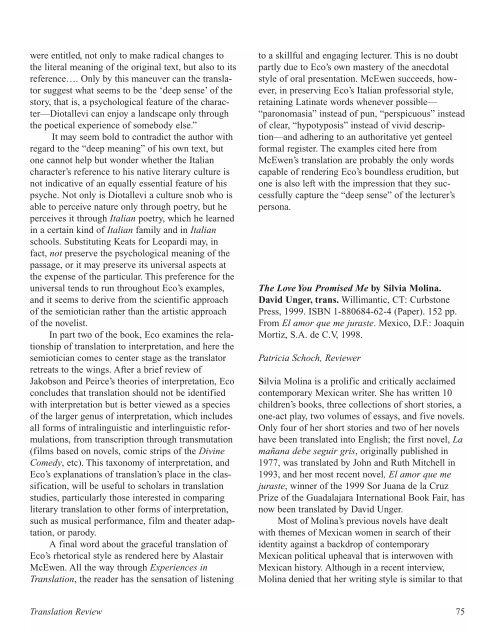Translation Review - The University of Texas at Dallas
Translation Review - The University of Texas at Dallas
Translation Review - The University of Texas at Dallas
You also want an ePaper? Increase the reach of your titles
YUMPU automatically turns print PDFs into web optimized ePapers that Google loves.
were entitled, not only to make radical changes to<br />
the literal meaning <strong>of</strong> the original text, but also to its<br />
reference…. Only by this maneuver can the transl<strong>at</strong>or<br />
suggest wh<strong>at</strong> seems to be the ‘deep sense’ <strong>of</strong> the<br />
story, th<strong>at</strong> is, a psychological fe<strong>at</strong>ure <strong>of</strong> the character—Diotallevi<br />
can enjoy a landscape only through<br />
the poetical experience <strong>of</strong> somebody else.”<br />
It may seem bold to contradict the author with<br />
regard to the “deep meaning” <strong>of</strong> his own text, but<br />
one cannot help but wonder whether the Italian<br />
character’s reference to his n<strong>at</strong>ive literary culture is<br />
not indic<strong>at</strong>ive <strong>of</strong> an equally essential fe<strong>at</strong>ure <strong>of</strong> his<br />
psyche. Not only is Diotallevi a culture snob who is<br />
able to perceive n<strong>at</strong>ure only through poetry, but he<br />
perceives it through Italian poetry, which he learned<br />
in a certain kind <strong>of</strong> Italian family and in Italian<br />
schools. Substituting Ke<strong>at</strong>s for Leopardi may, in<br />
fact, not preserve the psychological meaning <strong>of</strong> the<br />
passage, or it may preserve its universal aspects <strong>at</strong><br />
the expense <strong>of</strong> the particular. This preference for the<br />
universal tends to run throughout Eco’s examples,<br />
and it seems to derive from the scientific approach<br />
<strong>of</strong> the semiotician r<strong>at</strong>her than the artistic approach<br />
<strong>of</strong> the novelist.<br />
In part two <strong>of</strong> the book, Eco examines the rel<strong>at</strong>ionship<br />
<strong>of</strong> transl<strong>at</strong>ion to interpret<strong>at</strong>ion, and here the<br />
semiotician comes to center stage as the transl<strong>at</strong>or<br />
retre<strong>at</strong>s to the wings. After a brief review <strong>of</strong><br />
Jakobson and Peirce’s theories <strong>of</strong> interpret<strong>at</strong>ion, Eco<br />
concludes th<strong>at</strong> transl<strong>at</strong>ion should not be identified<br />
with interpret<strong>at</strong>ion but is better viewed as a species<br />
<strong>of</strong> the larger genus <strong>of</strong> interpret<strong>at</strong>ion, which includes<br />
all forms <strong>of</strong> intralinguistic and interlinguistic reformul<strong>at</strong>ions,<br />
from transcription through transmut<strong>at</strong>ion<br />
(films based on novels, comic strips <strong>of</strong> the Divine<br />
Comedy, etc). This taxonomy <strong>of</strong> interpret<strong>at</strong>ion, and<br />
Eco’s explan<strong>at</strong>ions <strong>of</strong> transl<strong>at</strong>ion’s place in the classific<strong>at</strong>ion,<br />
will be useful to scholars in transl<strong>at</strong>ion<br />
studies, particularly those interested in comparing<br />
literary transl<strong>at</strong>ion to other forms <strong>of</strong> interpret<strong>at</strong>ion,<br />
such as musical performance, film and the<strong>at</strong>er adapt<strong>at</strong>ion,<br />
or parody.<br />
A final word about the graceful transl<strong>at</strong>ion <strong>of</strong><br />
Eco’s rhetorical style as rendered here by Alastair<br />
McEwen. All the way through Experiences in<br />
<strong>Transl<strong>at</strong>ion</strong>, the reader has the sens<strong>at</strong>ion <strong>of</strong> listening<br />
to a skillful and engaging lecturer. This is no doubt<br />
partly due to Eco’s own mastery <strong>of</strong> the anecdotal<br />
style <strong>of</strong> oral present<strong>at</strong>ion. McEwen succeeds, however,<br />
in preserving Eco’s Italian pr<strong>of</strong>essorial style,<br />
retaining L<strong>at</strong>in<strong>at</strong>e words whenever possible—<br />
“paronomasia” instead <strong>of</strong> pun, “perspicuous” instead<br />
<strong>of</strong> clear, “hypotyposis” instead <strong>of</strong> vivid description—and<br />
adhering to an authorit<strong>at</strong>ive yet genteel<br />
formal register. <strong>The</strong> examples cited here from<br />
McEwen’s transl<strong>at</strong>ion are probably the only words<br />
capable <strong>of</strong> rendering Eco’s boundless erudition, but<br />
one is also left with the impression th<strong>at</strong> they successfully<br />
capture the “deep sense” <strong>of</strong> the lecturer’s<br />
persona.<br />
<strong>The</strong> Love You Promised Me by Silvia Molina.<br />
David Unger, trans. Willimantic, CT: Curbstone<br />
Press, 1999. ISBN 1-880684-62-4 (Paper). 152 pp.<br />
From El amor que me juraste. Mexico, D.F.: Joaquin<br />
Mortiz, S.A. de C.V, 1998.<br />
P<strong>at</strong>ricia Schoch, <strong>Review</strong>er<br />
Silvia Molina is a prolific and critically acclaimed<br />
contemporary Mexican writer. She has written 10<br />
children’s books, three collections <strong>of</strong> short stories, a<br />
one-act play, two volumes <strong>of</strong> essays, and five novels.<br />
Only four <strong>of</strong> her short stories and two <strong>of</strong> her novels<br />
have been transl<strong>at</strong>ed into English; the first novel, La<br />
mañana debe seguir gris, originally published in<br />
1977, was transl<strong>at</strong>ed by John and Ruth Mitchell in<br />
1993, and her most recent novel, El amor que me<br />
juraste, winner <strong>of</strong> the 1999 Sor Juana de la Cruz<br />
Prize <strong>of</strong> the Guadalajara Intern<strong>at</strong>ional Book Fair, has<br />
now been transl<strong>at</strong>ed by David Unger.<br />
Most <strong>of</strong> Molina’s previous novels have dealt<br />
with themes <strong>of</strong> Mexican women in search <strong>of</strong> their<br />
identity against a backdrop <strong>of</strong> contemporary<br />
Mexican political upheaval th<strong>at</strong> is interwoven with<br />
Mexican history. Although in a recent interview,<br />
Molina denied th<strong>at</strong> her writing style is similar to th<strong>at</strong><br />
<strong>Transl<strong>at</strong>ion</strong> <strong>Review</strong> 75

















